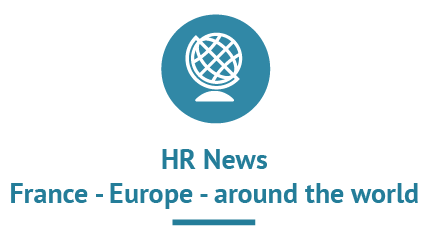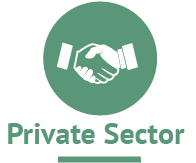|
If you are having trouble viewing this email, please
download the PDF version
or contact us.
|
 |
| #09 - November 2018 |
| PDF version - Manage your subscription - Search - Archives |

|
|
vision RH is a newsletter published by the French Directorate General for Administration and the Civil Service (DGAFP). |
|

|

|
| Organising social dialogue, perspectives on the variety of European models | |||||
|
Social dialogue is an essential part of the relationship between employers and public officials. Nurtured across decades, it is profoundly influenced by national character and public service models. It is also undergoing a thoroughgoing transformation. How do other countries organise this partnership? What are the practices outside France, and how can Europe contribute to changing and even harmonising regulations? We can make an initial correlation between the employment regime and the role of the social partners: although professional organisations are consulted for legislation that applies to staff covered by the staff regulations, they generally (with the exception of Finland) negotiate binding agreements – by category or branch – only for contract staff. At the end of 2017, a study of the central administrations of EU Member States revealed that the scope of these collective agreements is still quite diverse. They may cover all areas (as in Ireland and Sweden), exclude some areas (such as pensions in Italy or Greece) or even be confined to a single area (working time in Croatia or remuneration in the United Kingdom). Most social dialogue is established directly and equally between the various levels of the administration and the representative trade unions. Italy, however, has created ARAN, a dedicated negotiating structure that represents all public employers (central government, provinces, municipalities), which are grouped into twelve colleges. In Germany, collective agreements (TVöD) are by category, using the rationale of a career civil service, or region-based, while in the UK they are sectoral (8 Pay Review Bodies), since it is an employment-based civil service. In Spain, contractualisation and organisational restructuring have, over the years, led to an increase in the number of agreements, and the Spanish government is carrying out a wide-ranging consolidation effort in a bid to streamline management. The employers of the central administrations of 17 European countries (11 members1 and 6 observers2 as part of the European Public Administration Employers association, EUPAE) and the Trade Unions’ National and European Administration Delegation (TUNED) have set up a Sectoral Social Dialogue Committee (SSDC). This body is now the main source of proposals to the Commission for the development of strategies that have an impact on administrations. The Committee has issued a number of declarations, framework agreements and recommendations. After an initial project in late 2017 that gave rise to the publication of a guide (available in several languages) on tackling psychosocial risks, it has begun a new effort on the impact of digital technology on employees' work/life balance. 1 Belgium, Spain, France (represented by the DGAFP), Greece, Italy, Lithuania, Luxembourg, Czech Republic, Romania, Slovakia and United Kingdom 2 Germany, Austria, Hungary, Malta and Portugal |
|||||
|
|||||
|
|
|||||

|
|||||

|

|

|
| Second barometer of HR in the public sector in France | |||||
|
The second edition of the Barometer of HR in the public sector reveals high expectations in terms of training, quality of life at work, anticipation of employment needs, career paths and support for transfers (in order of importance). It should be noted that 76% of the employees and managers who responded to the survey said they were dissatisfied with HR policies. This figure was 44% in 2017. |
|||||
|
|||||
|
|
|||||

|
|||||
| Reform in the US Federal Public Service | |||||
|
As the Federal Civil Service Act celebrates its 40th anniversary, the Office of Personnel Management has announced major changes in hiring practices for Scientific, Technical, Engineering and Mathematics positions (STEM), as well as in the cybersecurity sector. Recruitment will be centralised by two dedicated federal agencies and a specific new compensation scheme will be introduced to make these jobs more appealing. |
|||||
|
|||||
|
|
|||||

|
|||||
| Draft ISO standard to support HR transformation | |||||
|
A set of standards for HR management has existed since 2011 (ISO STC 260). Draft standard NF ISO 30414, having to do with guidelines on human capital assessment, provides means for measuring and analysing data. The goal is to assess changing practices based on a range of criteria, including leadership, diversity, recruitment, internal mobility and productivity. |
|||||
|
|||||
|
|
|||||

|
|||||

|

|
| "The Right Company": Pôle Emploi's targeted recruitment app | |||||
|
Noting that only 20% of hires follow the publication of a job offer, Pôle Emploi (France's public employment service agency) has developed an app that increases spontaneous applicants' chances of success. By analysing recruitment data, the app targets high-potential companies in a given sector and advises users about the best means to get an interview. |
|||||
|
|||||
|
|
|||||

|
|||||
| A multi-lingual website dedicated to apprenticeships in the German civil service | |||||
|
The goal of Germany's new wir-sind-bund portal is to encourage as many apprenticeship candidates as possible to choose the public sector, regardless of their origin. The site, which presents the various professions and government departments in seven languages, provides answers to many practical questions, such as nationality requirements and the recognition of diplomas acquired abroad. |
|||||
|
|||||
|
|
|||||

|
|||||
| A degree-level economics apprenticeship programme in the British civil service | |||||
|
The British Civil Service has launched a degree-level apprenticeship programme. In 2019, five ministries will host, on a four-day-per-week basis, an initial group of 75 students, who will receive an annual salary of £20,000. The four-year course in economics is the result of a partnership between the British Treasury, the Bank of England and the University of Kent. |
|||||
|
|||||
|
|
|||||

|
|||||

|

|
| Certification course for HR experts in the Belgian civil service | |||||
|
HR professionals in the federal administration and related bodies can be granted certification in the areas of candidate selection and expertise, according to a methodology developed by DG Recruitment & Development. Three successive levels of autonomy (interview, administrative, then full autonomy) are offered. The programme combines face-to-face and online training and offers mentoring support. |
|||||
|
|||||
|
|
|||||

|
|||||
| "Teamunivers", the Danish government's new management tool | |||||
|
Successful project work often involves adapting management methods. The Danish government's Agency for Competence Development, in collaboration with various departments at national, regional and local level, has developed an educational tool. It helps users choose the most appropriate solution, based on a clear identification of the team's composition and the challenges to be met. |
|||||
|
|||||
|
|
|||||

|
|||||
| Ethical support 2.0 for the public hospital sector | |||||
|
In hospitals, the increasing use of smartphones is having a significant impact. Two regional delegations of the National Association for Vocational Training for Hospital Staff (ANFH) have set up a support system for all staff. The goal is to raise awareness of best practices (duty of confidentiality and upholding the image of the civil service) and specific risks (conduct during caregiving and digital risks for the establishment). |
|||||
|
|||||
|
|
|||||

|
|||||

|

|
| Launch of the "Safe Workspaces" Initiative in the Canadian Public Service | |||||
|
In the most recent employee survey, 18% of federal public servants reported having experienced harassment in the past two years. A working group was formed and formulated its recommendations in the form of the "Safe Workplaces" Initiative. Provisions specific to the civil service will be included in a bill on the prevention and resolution of harassment. |
|||||
|
|||||
|
|
|||||

|
|||||
| More regulation for teleworking in the Spanish government | |||||
|
Only 7% of Spanish public employees practice teleworking, although 85% would consider doing so if measures were taken to regulate working time. On the basis of these findings, the CSIF, the country's largest public sector union, submitted a proposal to the government, asking it to introduce regulations on working hours, allowing for an effective "right to disconnect". |
|||||
|
|||||
|
|
|||||

|
|||||
| European study on work-life balance | |||||
|
In the European Commission's recent study on Work Life Balance, Austria and Denmark shared first out of the 28 Member States. One-fifth of Europeans expressed dissatisfaction. There is high demand for the ability to adjust working hours (65% said they did not have access to it and one-third of the others said they their managers discouraged them from using it). |
|||||
|
|||||
|
|
|||||

|
|||||

|

|
| L’Oréal launches Fit Culture App, a new custom-made mobile app to welcome new employees | |||||
|
Although a recent European study showed that France still has a way to go in terms of employee commitment, several companies are seeking innovative solutions to improve this situation and create better results. Many factors affect motivation, including corporate culture, a feeling of connection, opportunities to share ideas and opinions, an atmosphere of trust, an individual/collective recognition programme and a sense of community. The onboarding period plays a key role in the integration process (for 86% of new hires, the decision to remain for the medium or long term is made within the first six months). Fit Culture is the world's first mobile app designed to help new L'Oréal employees (10,000 per year) understand, decode and master the company's culture within a month. It replaces some of the company's standard initial formalities, which convey an image that is increasingly out of step with a more responsive, connected world. Each day, newcomers are invited on a simple, playful journey involving information modules about entrepreneurship, agility, networking and collaboration. |
|||||
|
|||||
|
|
|||||

|
|||||

|

|
| Austria is successfully integrating public employees with disabilities | |||||
|
Ten years ago, the United Nations Convention on the Rights of Persons with Disabilities entered into force. Austria, which was one of the first countries to ratify the Convention, is underscoring its determination to do everything possible to ensure that the professional world is an active, driving force for integration. In 2017, integration was one of the priorities of the Austrian government's strategy. The Federal Civil Service plays a role in this initiative via an initial series of measures that complement the existing legislative framework: • Semi-annual publication of progress in achieving the quota set by law (4% of the workforce) • The position held by the staff member is not linked to a budgetary post (which allows for greater mobility)1 • Two to five additional days of leave per year (depending on the degree of disability). To provide support for government departments, particularly in terms of recruitment, the Ministry of Social Affairs has set up a dedicated platform, bundessache.at. It reviews job descriptions, checks conditions of employment and searches for potential candidates in cooperation with the local network in charge of professional assistance. Even before an employee takes up his or her duties, Bundessache checks with the department to be sure that all the arrangements enabling the agent to work independently and under the best conditions have been made. The same applies to services (personal assistance, individual coaching, transport). The Federal Administration Academy, which is responsible for initial and on-going training for staff, has also made disability issues a part of its processes (asking about special needs when registering for sessions, sign language interpretation in collaboration with the Equalizent association, informing managers about accessibility measures). Workshops are held on a regular basis in federal government departments to reminder participants of the regulations in force and to share best practices. Any citizen facing a situation of discrimination can call on an independent Disability Ombudsman. |
|||||
|
|||||
|
|
|||||

|
|||||

|
|
Share
|
||||
|
||||
| SUBSCRIBE - UPDATE YOUR SUBSCRIPTION - ARCHIVES - RSS - UNSUBSCRIBE |
|
French Directorate-General for Administration and the Civil Service (DGAFP)
Publication Manager: Thierry LE GOFF Managing Editor: Xavier MAIRE Editor-in-chief: Jean-Marc CHNEIDER Publication Coordinator and Autor: Jean-François ADRIAN Layout and graphic design: Jean-François ADRIAN and Alphania. The texts of the publication do not reflect the point of view of the DGAFP
In accordance to the French Act n°78-17 of 6 January 1978 on information technology, data files and civil liberties and to the european General Data Protection Regulation (GDPR), your personal data is stored securely and you are entitled to access, correct and delete them. To do so, you should send an e-mail to (contact-visionrh.dgafp@finances.gouv.fr) or write to DGAFP: 139, rue de Bercy - 75012 Paris; France.
Reproduction is authorized with mention of the source © DGAFP 2019 / N° ISSN: 2606-7528. |
|
|



